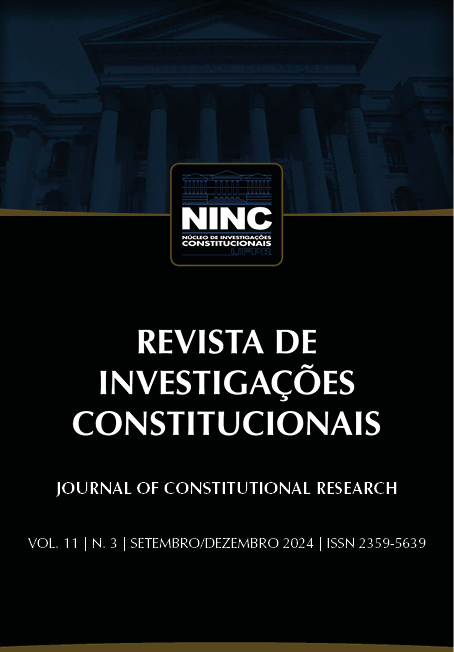Upholding the independence of constitutional courts in the EU beyond illiberal tendencies. Towards further convergence?
DOI:
https://doi.org/10.5380/rinc.v11i3.96206Palavras-chave:
independência judicial; tribunais constitucionais; Direito da UE; TJUE; Estado de DireitoResumo
This article explores the impact of the CJEU case law on the independence of constitutional courts in EU member states that have not experienced an illiberal shift, and whether it will lead to further convergence among EU members regarding their models of constitutional justice. While EU standards on judicial independence have justifiably emerged in a context of crisis, they have become autonomous standards of EU law, applicable to all EU member states. However, such standards may be at odds with the current legal frameworks and practices operating in some EU member states. This paper argues that the development of EU standards on judicial independence and impartiality may positively impact member states that do not experience a rule of law decline. On the one hand, they underline possible anomalies that may exist in the appointment procedures of national constitutional judges. On the other hand, this tension paves the way for a European dialogue on the definition of constitutional justice and the promotion of a rule of law culture.
Referências
AZPITARTE SÁNCHEZ, Miguel. El CGPJ y la renovación del Constitucional. El País, 05 Nov. 2022. Retrieved from: https://www.iustel.com/diario_del_derecho/noticia.asp?ref_iustel=1227455.
AZPITARTE SÁNCHEZ, Miguel. Estabilización del sistema político y fractura interna de los partidos. Crónica política y legislativa del año 2022. Revista española de derecho constitucional, n. 127, p.151-176, 2023.
BELTRÁN DE FELIPE, M.; SARMIENTO, Daniel. Por favor, salven al Tribunal Constitucional. El Mundo, 10 Nov. 2021. Retrieved from https://www.iustel.com/diario_del_derecho/noticia.asp?ref_iustel=1216644.
BLATIÈRE, Lauren. La protection évolutive de l’État de droit par la Cour de justice de l’Union européenne. RDLF, vol. 31, 2019.
BONELLI, Matteo; CLAES, Monica. Judicial serendipity: how Portuguese judges came to the rescue of the Polish judiciary. European Constitutional Law Review, vol. 14, n. 3, p. 622-643, 2018.
BUSTOS GISBERT, Rafael. Independencia judicial e integración europea. Tirant lo Blanch, Valencia, 2022.
CAMONI RODRÍGUEZ, Daniel. Una pequeña nota sobre el posible nombramiento de dos magistrados del Tribunal Constitucional por parte del gobierno. Fundación Manuel Giménez Abad, 2022. Retrieved from https://www.fundacionmgimenezabad.es/es/una-pequena-nota-sobre-el-posible-nombramiento-de-dos-magistrados-del-tribunal-constitucional-por
CHAMPEIL-DESPLATS, Véronique. Faut-il fixer des critères déontologiques pour les candidats aux fonctions de membre du Conseil constitutionnel. In: LEMAIRE, E.; PERROUD, T. Le Conseil constitutionnel à l’épreuve de la déontologie et de la transparence. Institut Francophone pour la Justice et la Démocratie, 2022. p. 21-32.
CHOPPLET, Antoine. Les membres de droit et à vie du Conseil constitutionnel: inutile réforme et nécessaire abrogation. LEMAIRE, E. ; PERROUD, T. Le Conseil constitutionnel à l’épreuve de la déontologie et de la transparence. Institut Francophone pour la Justice et la Démocratie, 2022. p.123-136.
DOMÉNECH, Gabriel. Los nuevos magistrados del Tribunal Constitucional: un modelo a imitar. Valencia Plaza, 2021. Retrieved from https://valenciaplaza.com/nuevos-magistrados-tribunal-constitucional-modelo-imitar.
DISANT, Mathieu; LARROUTUROU, Thibaut. La nomination des juges nationaux saisie par les juridictions européennes. Revue Trimestrielle des Droits de l’Homme, vol. 4, n. 18, p. 791-806, 2021.
FONTAINE, Lauréline. Bilan et réflexions sur une éthique de la justice constitutionnelle à la lumière de ce qu’en font et de ce qu’en disent ses acteurs. In: LEMAIRE, E.; PERROUD, T. Le Conseil constitutionnel à l’épreuve de la déontologie et de la transparence. Institut Francophone pour la Justice et la Démocratie, 2022. p. 151-198.
GARCÍA DE ENTERRÍA, Eduardo. La posición jurídica del Tribunal Constitucional en el sistema español: posibilidades y perspectivas. Revista Española de Derecho Constitucional, n. 100, p. 39-131, 2014.
HILLION, Christophe. Overseeing the rule of law in the European Union. SIEPS European Policy Analysis. 2016. Retrieved from: https://www.sieps.se/en/publications/2016/overseeing-the-rule-of-law-in-the-european-union-legal-mandate-and-means-20161epa/Sieps_2016_1_epa.
KELEMEN, R. Daniel. The European Union’s failure to address the autocracy crisis: MacGyver, Rube Goldberg, and Europe’s unused tools. Journal of European Integration, vol. 45, n. 2, p. 223-238, 2022.
KOCHENOV, Dimitry.; BÁRD, Petra. The last soldier standing? Courts versus politicians and the rule of law crisis in the new member states of the EU. European Yearbook of Constitutional Law, vol. 1, p. 243-287, 2019.
LELOUP, Mathieu, KOCHENOV, Dimitry, & DIMITROVS, A. Non-Regression: Opening the Door to Solving the ‘Copenhagen Dilemma’? All the Eyes on Case C-896/19 Repubblika v Il-Prim Ministru. RECONNECT Working Paper, Leuven, n. 15, 2021. Retrieved from https://ssrn.com/abstract=3875749.
LELOUP, Mathieu. Guðmundur Andri Ástráðsson: the right to a tribunal established by law expanded to the appointment of judges. Strasbourg Observers, 2020. Retrieved from https://strasbourgobservers.com/2020/12/18/gudmundur-andri-astradsson-the-right-to-a-tribunal-established-by-law-expanded-to-the-appointment-of-judges/.
MAGALDI, Nuria. La independencia de los tribunales constitucionales nacionales: Una visión desde el derecho europeo. Tocqueville Papers, n. 23, 2022.
MAŃKO, Rafał. European Court of Justice case law on judicial independence. Brussels: EPRS | European Parliamentary Research Service, 2023.
MARTÍN GUARDADO, Sergio. La última crisis de legitimidad de la jurisdicción constitucional en España. Revista de Investigações Constitucionais, Curitiba, vol. 11, n. 1, e255, jan./abr. 2024. DOI: 10.5380/rinc.v11i1.91471.
MARTÍN RODRÍGUEZ, Pablo M. El Estado de Derecho en la Unión Europea. Madrid: Marcial Pons, 2021.
MEURANT, Cédric. Le rôle du service juridique du Conseil constitutionnel. In: LEMAIRE, E.; PERROUD, T. Le Conseil constitutionnel à l’épreuve de la déontologie et de la transparence. Institut Francophone pour la Justice et la Démocratie, 2022. p. 313-332.
NICOLAS, B.; ISRAËL, L. Quelques éclairages sociologiques sur la composition du Conseil constitutionnel. In: LEMAIRE, E.; PERROUD, T. Le Conseil constitutionnel à l’épreuve de la déontologie et de la transparence. Institut Francophone pour la Justice et la Démocratie, 2022. p. 61-82.
PLATON, Sébastien. La valeur des valeurs. La confirmation de la validité du mécanisme de conditionnalité « État de droit » par la Cour de Justice de l’Union Européenne. Cahiers de droit européen, vol. 1, p. 197-238, 2022.
PECH, Laurent; BÁRD, Petra. The Commission's Rule of Law Report and the EU Monitoring and Enforcement of Article 2 TEU Values. European Parliament’s Policy Department for Citizens’ Rights and Constitutional Affairs, 2022.
PECH, Laurent; WACHOCIEC, Patryk; MAZUR, Dariusz. Poland’s Rule of Law Breakdown: a Five-Year Assessment of EU’s (In)Action. Hague Journal on the Rule of Law, vol. 13, p. 1-43, 2021.
PECH, Laurent; PLATON, Sébastien. Rule of Law backsliding in the EU: The Court of Justice to the rescue? Some thoughts on the ECJ ruling in Associação Sindical dos Juízes Portugueses. EU Law Analysis, 2018. Retrieved from https://eulawanalysis.blogspot.com/2018/03/rule-of-law-backsliding-in-eu-court-of.html.
PECH, Laurent. A Union founded on the Rule of Law: Meaning and Reality of the Rule of Law as a Constitutional Principle of EU Law. European Constitutional Law Review, vol. 6, p. 359-396, 2010.
PERROUD, Thomas. A Male, White and Conservative Constitutional Judge. The Composition of the French Constitutional Council After the New Appointments. Verfassungsblog, 2022. Retrieved from https://verfassungsblog.de/a-male-white-and-conservative-constitutional-judge/.
SCHEPPELE, Kim Lane; KOCHENOV, Dimitry; GRABOWSKA-MOROZ, Barbara. EU Values Are Law, after All: Enforcing EU Values through Systemic Infringement Actions by the European Commission and the Member States of the European Union. Yearbook of European Law, vol. 39, p. 3-121, 2020.
SCHROEDER, Werner. The Rule of Law as a Value in the Sense of Article 2 TEU: What Does It Mean and Imply? In: VON BOGDANDY, Armin; BOGDANOWICZ, P.; CANOR, I.; GRABENWARTER, C.; TABOROWSKI, M.; SCHMIDT, M. (Eds.). Defending Checks and Balances in EU Member State. Heidelberg: Springer, 2021. p. 105-126.
SPIEKER, Luke Dimitrios. Breathing Life into the Union’s Common Values: On the Judicial Application of Article 2 TEU in the EU Value Crisis. German Law Journal, vol. 20, n. 8, p. 1182-1213, 2019.
SZYMCZAK, David. Question prioritaire de constitutionnalité et Convention européenne des droits de l’homme. L’européanisation heurtée du Conseil constitutionnel français. Jus Politicum IV, Dalloz, 2012.
STEIBLE, Bettina. El continuum de los criterios de Copenhague en un contexto de crisis del Estado de Derecho. PÉREZ MIRAS, Antonio; M. TERUEL LOZANO, Germán; ROMBOLI, Silvia; PALOMBINO, Giacomo (dirs.). Constitucionalismo: diálogos intergenacionales entre España e Italia. Madrid: BOE-CEPC.
ECONOMIST INTELLIGENCE UNIT, Democracy Index 2021, 2022.
WACHSMANN, Patrick. Les membres du Conseil constitutionnel au risque la déontologie. In: LEMAIRE, E.; PERROUD, T. Le Conseil constitutionnel à l’épreuve de la déontologie et de la transparence. Institut Francophone pour la Justice et la Démocratie, 2022. p. 33-60.
Downloads
Publicado
Como Citar
Edição
Seção
Licença
Copyright (c) 2024 Bettina Steible

Este trabalho está licenciado sob uma licença Creative Commons Attribution 4.0 International License. Autores que publicam nesta revista concordam com os seguintes termos:
- Autores mantém os direitos autorais e concedem à revista o direito de primeira publicação, com o trabalho simultaneamente licenciado sob a Creative Commons - Atribuição 4.0 Internacional que permite o compartilhamento do trabalho com reconhecimento da autoria e publicação inicial nesta revista.
- Autores têm autorização para assumir contratos adicionais separadamente, para distribuição não-exclusiva da versão do trabalho publicada nesta revista (ex.: publicar em repositório institucional ou como capítulo de livro), com reconhecimento de autoria e publicação inicial nesta revista.
- Autores têm permissão e são estimulados a publicar e distribuir seu trabalho online (ex.: em repositórios institucionais ou na sua página pessoal) a qualquer ponto antes ou durante o processo editorial, já que isso pode gerar alterações produtivas, bem como aumentar o impacto e a citação do trabalho publicado (Veja O Efeito do Acesso Livre).
























